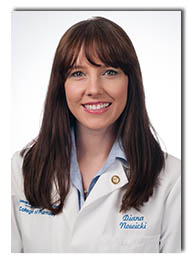You’re a pharmacy resident, now what?
By Diana Nicole Nowicki, PharmD
After spending the last six years preparing for a pharmacy career, I was accepted into a residency program. I expected to feel an immediate difference during this transition. The only change I did notice was the confusion I felt about the next steps after pharmacy school. I kept asking myself, “I’m a pharmacy resident, but now what do I do?”
For some of my colleagues, the career path and the steps to follow have been clear since early pharmacy school. Personally, I have had a passion for the profession but have yet to settle on a specialty on which to focus. This can make finding your place within the profession even more difficult. I have learned so far that even without my mind set on one particular area, there are still plenty of constructive steps to take to find yourself within your residency program and the profession. As a first year pharmacy resident, I set out to answer the question, “Now what?” and here is what I learned thus far.
Establish yourself as a new practitioner
Some residents find it difficult to transition from being a student to a new practitioner. Not all residency programs or preceptors allow you to practice autonomously. Regardless of the level of independence, take the opportunity to practice working up patients and addressing problems as if you were the sole pharmacist involved. Reflect on how your decisions would have impacted patient care and compare your approach to your preceptor’s strategies. This will not only allow you to practice decision-making in a learning environment, but allow you to assess your strengths and gaps in pharmacy practice. Continue to absorb your preceptor’s teaching and practice style so that you can build upon what you have learned previously and develop your own style. Ultimately, this year of residency is for you to develop your own teaching philosophy and unique practice style. Use this time to try out different data collection sheets, experiment with educational exercises for students, and freshen up on topics that are new or a weakness of yours.
Take advantage of rotations and opportunities
Even if you know what area of pharmacy on which you want to focus, it is important to always take advantage of new opportunities. Plenty of residents have shared stories of finding their future career path unexpectedly while trying out a different practice area. There are other reasons to choose rotations outside of your comfort zone including to diversify your curriculum vitae and strengthen your core pharmacy skills. No matter what practice area you are in, the basic skills of pharmacokinetics, pharmacodynamics, patient interaction, and drug utilization review are at the core of each experience. Continuing to improve these skills will further make you a well-balanced pharmacist. In a marketplace where pharmacists play multiple roles and may be expected to engage in a hybrid practice model, having distinctive clinical rotation experiences can position you to appropriately handle varying career opportunities. This is especially true for those of us who have yet to find our place in the profession. Not only will selecting an assortment of rotations let new practitioners “find their calling” but continue to make them desirable candidates for various career paths.
These opportunities are not just limited to rotations. Depending on the timing and where you practice, there are chances for you to be involved in protocol development, implementing new pharmacy programs, or devising patient outreach programs. Being able to talk about these projects during a job or PGY2 residency interview will showcase your leadership and initiative. In addition, allowing yourself to take time away from the traditional activities of residency will provide a stress reliever.
Form relationships with preceptors and mentors
For many of us, we chose our residency program for the chance to work with clinicians whom we admire, want to learn from, and whom we got along with during the interview process. Now that these pharmacists are our direct supervisors in various clinical scenarios, it can be an intimidating or awkward process to begin to see them as colleagues, and vice versa. As you become part of the clinical team, remember that although you are new to the institution’s pharmacy dynamic, it is important to gain the trust of your peers by being dependable and trustworthy. This will assist in the transition to a colleague.
Depending on the program, you may also have the prospect of being assigned or selecting a mentor. For most individuals, this is a pharmacist who practices in their interest area. Consider selecting another pharmacist mentor outside of your interest area who offers an alternative perspective. Whichever you choose, preceptors and mentors can offer networking connections, advice on career search and advancement, and be your confidante and advocate during and after your residency.
Explore the job market
As December approaches, so does the half-way point for the residency year. Before we know it, it will be time to start the interviewing process over again. The end of the year is also the time when thousands of residents nationwide converge upon the American Society of Health-System Pharmacists (ASHP) Midyear Clinical Meeting and Exhibition. This conference offers vast networking through evening socials, poster presentations, the Residency Showcase, and Personnel Placement Service (PPS). It is advisable to be on your best behavior and have business cards in hand. Your next employer could easily be sitting next to you on the plane ride home or on one of Universal Studios Florida™ attractions. Be open to hearing about different job prospects as the field of pharmacy is multidisciplinary and limitless.
Tap into organizational resources
ICHP and other organizations can help bridge the gaps in your job search. Below are just some of the ways to network:
- Join an ICHP Committee
- Utilize career boards like ICHP Career Center or ASHP CareerPharm




